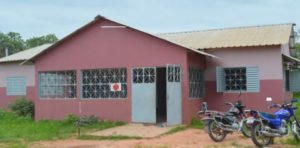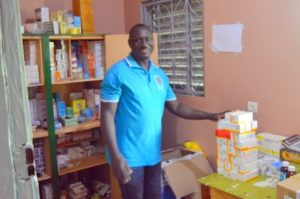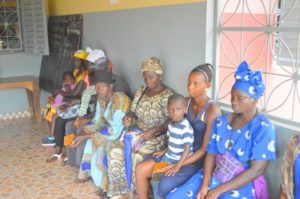Mission / Service Opportunity
Mennonite Clinic Catel, Guinea Bissau
Mennonite clinic seeks volunteer medical professionals
 A small Mennonite clinic in the village of Catel, Guinea Bissau is seeking short-term volunteers (2 weeks or longer) to see patients and train staff. Knowledge of either French or Portuguese is helpful, but translation options can be arranged locally.
A small Mennonite clinic in the village of Catel, Guinea Bissau is seeking short-term volunteers (2 weeks or longer) to see patients and train staff. Knowledge of either French or Portuguese is helpful, but translation options can be arranged locally.
The most common illnesses presented at the clinic day by day are respiratory infections, urinary tract infections (STDs), diarrhea, fungal skin infections, and eye infections. Medical conditions for which the local staff needs more training and the experience they can gain by working with well qualified medical professionals include dental issues, rheumatoid arthritis and muscular articulation problems, pediatrics, pre-natal and neo-natal care, serious injury and urgent care, nutrition, and epilepsy. Surgeons are also needed for ophthalmic problems (especially cataracts) and hernias.
Mennonite Clinic Catel had its origins in 2005 when mission workers from Eastern Mennonite Missions (EMM) went to the village to plant a church. The need for a medical ministry was obvious from the start of the work in that area of Guinea Bissau.
The first medical ministry was provided by the pioneer mission worker using the support of Hesperian Foundation publication Where There Is No Doctor. Consultations and medical care were administered on the missionary’s veranda. During those early years, 2005-09, hundreds of patients were successfully treated, and the clinic gained a reputation throughout the region as a reputable place to go for compassionate medical care.
Beginning in 2010, short-term medical professionals began coming through EMM to assist at the clinic. From 2009-11, they also received teams from the University of Arizona Medical School under the direction of Dr. Ron Pust, who brought students exploring service in underdeveloped countries.
 During that same period, the local church community sent one of the believers, Tening Mane, to a two-year nurse’s training course in Ziguinchor, Senegal. The course qualified him to administer a rural clinic or find employment at an urban hospital. When Tening finished his studies he took charge of administering the clinic and being the chief caregiver. Since then, the clinic has employed a second nurse with qualifications similar to his. These two persons are able to provide care for most of the cases that come to the clinic in Catel. Those whose situations are beyond their ability to care for are referred to small town hospitals about 15 miles either side of Catel. That process is often unsatisfactory because patients fail to take the initiative to go there or if they do go, the treatment they receive is inadequate.
During that same period, the local church community sent one of the believers, Tening Mane, to a two-year nurse’s training course in Ziguinchor, Senegal. The course qualified him to administer a rural clinic or find employment at an urban hospital. When Tening finished his studies he took charge of administering the clinic and being the chief caregiver. Since then, the clinic has employed a second nurse with qualifications similar to his. These two persons are able to provide care for most of the cases that come to the clinic in Catel. Those whose situations are beyond their ability to care for are referred to small town hospitals about 15 miles either side of Catel. That process is often unsatisfactory because patients fail to take the initiative to go there or if they do go, the treatment they receive is inadequate.
Mennonite Clinic Catel is a private institution but is in full cooperation with these nearby government sponsored hospitals. The regional Guinea Bissau health ministry officer is very pleased with the work of the Mennonite Clinic, and it is he who is requesting that the Catel clinic bring in more expatriate medical professionals. He is confident that the presence of such persons will make a positive contribution to the level of medical care for the entire region.
 Word of mouth has carried positive reports for compassionate care and healing success around Guinea Bissau for the Mennonite clinic. People are travelling long distances to be treated in Catel.
Word of mouth has carried positive reports for compassionate care and healing success around Guinea Bissau for the Mennonite clinic. People are travelling long distances to be treated in Catel.
Beryl Forrester, EMM mission worker who relates closely with the clinic, cites three major objectives for encouraging North American short-term volunteers coming to assist in the work at Catel:
Improving the level of medical expertise for a region within a 20 mile radius of Catel, an area that has a multitude of rural villages where health care facilities are very inadequate or non-existent.
Providing the small staff with training and experience in handling a broader range of treatment for illnesses that show up at the Catel clinic.
Continuing to support a positive witness for the Kingdom of God in that region.
Housing is available for volunteers in the village. Knowledge of either French or Portuguese is helpful, but translation options can be arranged locally. Flight connections are best through Dakar via South Africa Air.
For further information or to express interest, contact Beryl Forrester.
